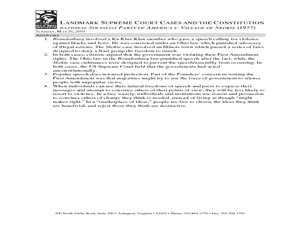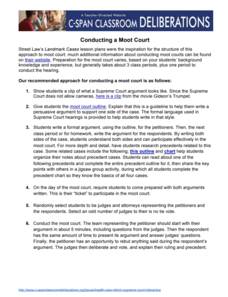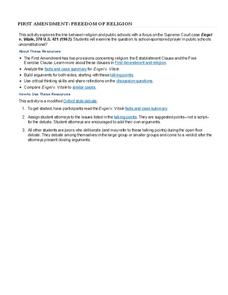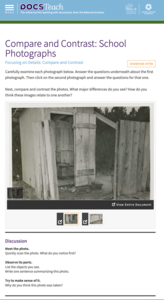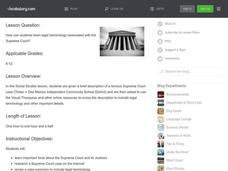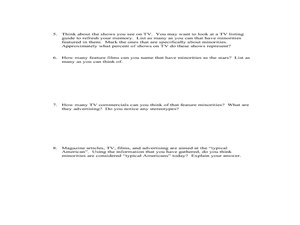Carolina K-12
Public Christmas Displays and Lynch v. Donnelly
Does a Christmas display on government property violate the Constitution? Learners study the Establishment Clause of the First Amendment and learn about the landmark Supreme Court case Lynch v. Donnelly through watching a...
Administrative Office of the US Courts
US v. Alvarez
Is it illegal to lie about military service? Discuss the ways the First Amendment affects the Stolen Valor Act with a lesson that focuses on the Supreme Court case U.S. v. Alvarez. As high schoolers learn more about the history of the...
Curated OER
The Supremes
High schoolers discuss steps cases go through to reach Supreme Court, examine Bill of Rights, and rank rights in order of importance to them. Students then research Supreme Court case dealing with one of first ten amendments, and write...
State Bar of Texas
Marbury v. Madison
Who has the final say in matters dealing with the rules under the United States Constitution? The case Marbury v. Madison brings to light the issue of judicial review. Learners investigate the Supreme Court's opinion in the case with a...
State Bar of Texas
Miranda v. Arizona
You have the right to remain silent—but why? Scholars analyze the nature of what has become known as the Miranda Rights. A short video along with paired group work and discussion opens the issue of the rights of the accused upon arrest....
Carolina K-12
Marsh v. Chambers and the Establishment Clause
1983 Supreme Court case Marsh v. Chambers, which centers on whether opening a legislative session with a prayer violates the Establishment Clause in the First Amendment to the US Constitution, is the focus of a series of discussions and...
Curated OER
Landmark Supreme Court Cases and the Constitution: National Socialist Party of America v. Village of Skokie (1977)
Students examine the impact of court decisions. In this Supreme Court lesson, students read the National Socialist Party of America v. Village of Skokie (1977) case study regarding First Amendment Rights. Students take notes on the case...
Curated OER
Landmark Supreme Court Cases and the Constitution: Reynolds v. United States (1878)
High schoolers examine the impact of court decisions. In this Supreme Court lesson, students read the Reynolds v. United States (1878) case study regarding first election decided by the House of Representatives. High schoolers take...
Judicial Learning Center
The Appeal Process
Why doesn't the Supreme Court hear testimony from witnesses? How do they complete an entire proceeding in less than two hours? A helpful lesson guides scholars of criminology through these and other questions by explaining how appeals...
Judicial Learning Center
Your 1st Amendment Rights
Why should classes care about the First Amendment? An engaging lesson serves as a powerful tool for answering just that. As all four cases in the lesson relate directly to freedom of expression in schools, young scholars explore the...
C-SPAN
Conducting a Moot Court
Review the conduct of different roles within the Supreme Court. A moot court activity educates learners about the roles of each member of the court and the process of a case with video clips, research activities, a graphic organizer,...
Constitutional Rights Foundation
Prayer and Friday Night Lights? An Establishment Clause Case from Texas
Is a Christian prayer before a Friday night football game a nice gesture or the imposition of religion on the rest of the community? A resource asks the question using a clip from the popular movie "Friday Night Lights" and readings...
C-SPAN
14th Amendment Equal Protection Clause
Two Supreme Court cases, Plessy v. Ferguson and Brown v. Board of Education take center stage in a lesson about the Equal Protection Clause of the 14th Amendment. Class members research both cases to compare and contrast the rulings.
Administrative Office of the US Courts
Engel v. Vitale
"Is school-sponsored prayer in public schools unconstitutional?" That is the question teams debate as they consider the arguments presented to the Supreme Court in Engel v. Vitale. The attorneys study the provided talking points and...
New York State Education Department
US History and Government Examination: January 2011
The presidencies of John F. Kennedy, Richard Nixon, and Ronald Reagan were defined by the Cold War. Using primary source documents and scaffolded analysis questions, pupils explore the effect the Cold War had on these presidencies. A...
DocsTeach
Compare and Contrast: School Photographs
Separate and very unequal! An interactive presents learners with two images: a photograph of a boys' bathroom at a school in Gloucester County, Virginia, and a second of a girls' bathroom at a different school in the same county. The...
Curated OER
Supreme court Decisions on Freedom of Religion
Eleventh graders analyze the limits and bounds of religious freedom issues in the United States through several Supreme Court case decisions.
Heritage Foundation
Procedural Rights: Amendments VI, VII, and VIII
Even in court, your class members have procedural rights provided by the amendments. Teach high schoolers this important lesson by using the 18th installment of a 20-part unit exploring the US Constitution. The resource provides several...
Curated OER
Words That Hold Court
Students recognize the importance of the Supreme Court. In this legal terminology lesson, students define a list of words to understand the Supreme Court and the language used in cases. Students revise a case summary.
Curated OER
Words That Hold Court
Learners research legal terminology used in the Supreme Court. For this legal terminology lesson, students study a quote from President Obama about the Supreme Court. Learners make a list of facts about the Supreme Court and the justices...
Curated OER
Brown v. Board of Education
Young scholars examine school segregation and equal protection laws. In this Supreme Court activity, students examine primary documents from Brown v. Board of Education and discuss the implications of the decision.
Curated OER
Texas v. Johnson
Students examine the freedom of speech. For this Supreme Court lesson, students analyze primary documents from Texas v. Johnson and discuss the implications of the decision regarding flag burning.
Curated OER
The Supreme Court's Rulings on Young People
Students read an article describing five Supreme Court cases involving students and choose one case to conduct further research on.
Curated OER
Minorities in Mainstream American Society
So many people fought for Civil Rights in the United States. Read about the Civil Rights Act of 1964, and discuss what the act guarantees. Then pass out a slew of magazines and encourage them to observe how often minorities appear in...
Other popular searches
- Landmark Supreme Court Cases
- Famous Supreme Court Cases
- Racism Supreme Court Cases
- U.s. Supreme Court Cases
- Supreme Court Cases Poster
- Us Supreme Court Cases






